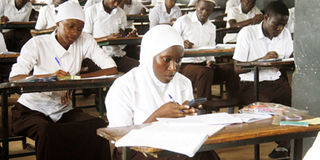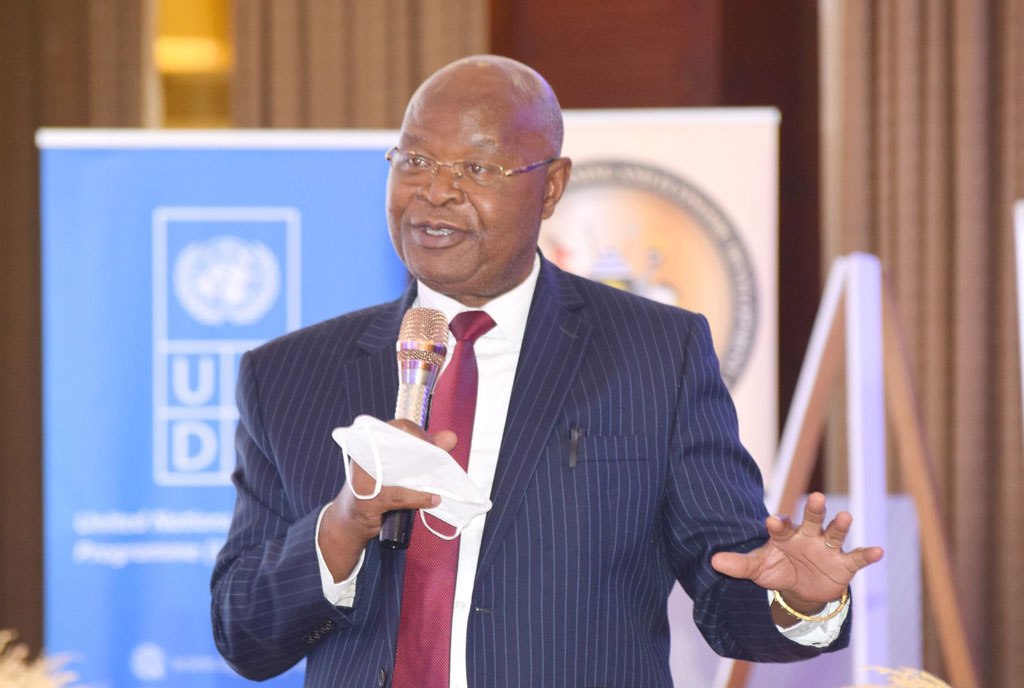Do high school fees translate into quality education?

Students of Kakungulu Memorial School in Kibuli during their Mathematics Paper II exam recently. Many parents argue that they pay high school fees because the schools offer quality education. PHOTO BY ABUBAKER LUBOWA
What you need to know:
- Every parent wants quality education for their children. And today, expensive schools charge not less than Shs1m are associated with quality. Many parents flock these schools in search of vacancies willing to cough the money. However, the big question is, are parents getting their money’s worth?
As schools open for the new term, the word on many a parents’ lips today and the days preceding it is school fees. Most of them complaining that it gets higher as years go by. In the past two years, there has been going back and forth of government and school owners on school fees increment.
In fact on February 5, 2018, Daily Monitor reported that schools had defied government on increasing school fees. On January, 21, this newspaper run a story on how private school operators protested a government proposal to enact a policy that would regulate tuition in learning institutions.
For instance, two million is an amount you pay for any child starting Primary One at Gombe Junior School in Wakiso. This includes tuition, personal requirements and uniform. But there are other charges such as development fee and admission fee, among others. Yet, a flat course at any university in Uganda costs between Shs700,000 and Shs1m per semester. So, why would a Primary One child pay an amount twice or similar to that of a university student?
The justification
Samuel Mulindwa, the principal at Gombe schools, argues that the money paid caters for most of the child’s personal and school requirements that parents are not supposed to buy.
He gives an example of items such as school uniforms, text books, work books, mattresses, fountain pens, shoe polish and brush, toothpaste, buckets, washing clothes and detergent, hair salon services, exercise books as well seasonal food.
At secondary level, he says, “We equip our students with skills such as crafts making, brass band, making carpets, baking and tailoring. We strengthen their book writing skills through the writers’ club, as well as photography skills.”
“We also involve our students in exchange programmes with countries such as India. That is why our curriculum is quite different.” “Our menu is good because we resorted to hiring professional catering services. We follow a strict diet comprised of peas, chicken, fish, meat, beans.”
Mulindwa also says primary pupils pay more than their secondary counterparts because handling young children is delicate.
You must employ wardens, matrons, and nurses to keep watch of the children. “The primary section needs a special diet, cleaning since most of them wet beds. We expose our learners to technology at a young age through introducing them to using computers, tablets,” Mulindwa notes.
At Seeta High School, Mukono, where students are required to pay Shs1.6m, Paul Baziira, an administrator, says the school, in addition to serving a high end menu, the students sit external examinations from time to time.
“We change their meals every day. The school also has very many examinations marked out of the school to audit students’ progress. These examiners are paid highly,” he says.
Baziira also says the students take different study tours such as Geography trips which are funded by the school as well as participate in a number of sports at the national level such as lawn tennis, basketball, football. According to him, the school incurs costs in registration and subscription for a team and the players as well as buying the necessary equipment.
On why the school charges uniform highly, he says: “We provide casual wear and sportswear for jogging. And usually our students wear uniform according to the different days and hours which means there is a change of uniform at any particular time of the day.”
Value for money
Expensive schools have come to be synonymous with good grades and so some parents argue that they would rather pay since their child’s good grade is the accountability they need.
Moses Kappa, a parent, forks out at least Shs1.8m per term for his son at St. Mary’s College, Kisubi. He also has another child at St. Mary’s Kitende Secondary School where he pays almost a similar amount.
“These schools provide quality education. If you look at Kitende, it is one of those schools sending the highest number of students to university on government sponsorship as well as being a household name in games and sports across the region,” he explains.
However, Mark Arinaitwe, a former student at Our Lady of Africa Namilyango argues that whereas they paid high fees, the school was more centered on academics than other activities.
“However, he says the services are worth the money because the teacher-student ratio is reasonable with each stream having between 28 to 32 students. The sick bay too has fulltime nurses and good accommodation facilities,” Arinaitwe says.
Not all is well
In economics, the only way to grow a business is by reinvesting profits or acquiring credit. However, schools nowadays prefer being funded by parents at every stage of their growth.
For example, Henry Mbabazi, a parent, cites fees such as admission fee, which is between Shs100,000 and Shs200,000 depending on the school.
“On the first day I took my daughter to one of the top secondary schools in Gayaza, the head teacher told me to contribute for the school bus. But my daughter left without using it,” he says.
Nimrod Amanya, a student at a christian high school in Mukono says their uniforms cost Shs400,000. “Students take almost a term without uniform because administrators told us the uniforms are imported from Scotland,” he says.
Most schools have specific requirements. They will specify the type of paper and pens parents should buy such as Rotatrim and Fountain pens.
Not so long ago Alex Kakooza, the permanent secretary in the Ministry of Education and Sports, warned schools against charging interview fees saying the charges were illegal and outside the law. But most schools are yet to implement the directive. At Seeta Junior School in Mukono District, a parent must part with Shs50,000 if a child is to sit for an interview and it is nonrefundable.
Henry Okia, the principal of Hillside Primary School, new entrants are supposed to pay Shs100,000 application and interview fee.
“At Hillside, we increase fees after every three years. We charge depending on what we offer and the economic situation such as food, fuel and water and other costs. For example, the rise in fuel is a factor because we transport children and it affects us so you cannot maintain the same charges. And also we agree with parents on increment of fees during meetings. We do it for the good of the children,” Okia asserts.
Where is the problem?
But Patrick Kaboyo, the national secretary for Federation of Non-State Education Institutions, argues that the introduction of liberalisation policy created excitement but with no thorough thought about its ramifications.
“The economy is controlled by market forces and it is very hard to regulate the market when you have no control over it. Parents now bear the brunt of high school charges due to market forces,” he notes.
“For every school, the Education ministry has re-echoed the ban for increment, but schools continue to increase fees and parents are paying. But they are paying without any vein of opportunity to discuss what that increment is going to be.”
Mbabazi, a parent, argues that whenever they are invited for PTA meetings, school administrators have already determined the increment in fees, leaving parents with no chance for negotiations.
Interventions
The Ministry of Education and Sports intervenes by giving circulars to all schools in the country stating clearly the guidelines on increasing school charges.
For instance, the first guideline states: “No school, private or government shall increase school fees for whatever reason without written authorisation from the permanent secretary, Ministry of Education and Sports and or Chief Administrative Officer/ Town clerk as the case may be.”
The second reads: “Other cash and non-cash requirements outside the approved school fees are strictly prohibited. All non-cash items must be catered for in the approved school budget.”
However, Kaboyo says the circulars have failed to create impact and there is need for stringent measures to be taken on regulation.
“Open up the discussion for regulation. we know that circulars are issued by the Ministry of Education and Sports; but circulars are not enough and they do not speak. Circulars sent to these schools might stop in offices. We need to look at the implementation, the monitoring and review of the directive,” he says
He adds there is need to review or put in place a holistic liberalisation policy that addresses the current challenges. Government should regulate the fares that are attached on all social sector areas such as education, health and transport, among others.
A recent report on education and schools in Uganda by Twaweza, a civil society organisation, revealed that paying excessive fees in both private and secondary schools is the biggest challenge to parents.
With the high fees being charged, it is no longer education for all but rather education for some.
So, if you are a parent looking for a suitable school for your child, ask yourself when reviewing options whether you will get your money’s worth or if it could be equally well spent in a different school with a different fees structure!
Solution to poor public facilities
“Due to breakdown in most of our public institutions and schools in particular, many of the parents are aware of this. They take the children to a private school or one that charges more because they believe the teachers would be facilitated better and therefore more likely to give their all to the children under their care. Unlike in public schools plagued with absenteeism and poorly facilitated teachers. Secondly, grades have been the measure for joining higher institution of learning. The schools that charge highly have more students with better grades; at least that is the trend in Uganda; whether it is by cheating or doing a good work. The end result is that one gets to qualify for a good course at university and possibly on a government scholarship. That is the dream for many parents.”
Dr Edward Ogwang, parent.
Sample fees
A mini survey indicates several schools fees is higher than Shs1m including:
Kampala parents school (Shs2m)
Gombe Junior School (Shs1.6m)
Green Hill Academy (Shs1.4m)
City Parents School (Shs1.2m)
Seeta Junior School, Mbalala (Shs1.5m)
Hillside P/School, Naalya (Shs1.2m)
St. Andrew Kaggwa Gombe H/S (Shs1.3m)
Green Hill Academy (Shs1.4m)
Seroma Christian High School (Shs1.2m)
Seeta High School (Shs1.6m)
St. Mary’s Kisubi (Shs1.8m)
Light Academy (Shs1.8m)



